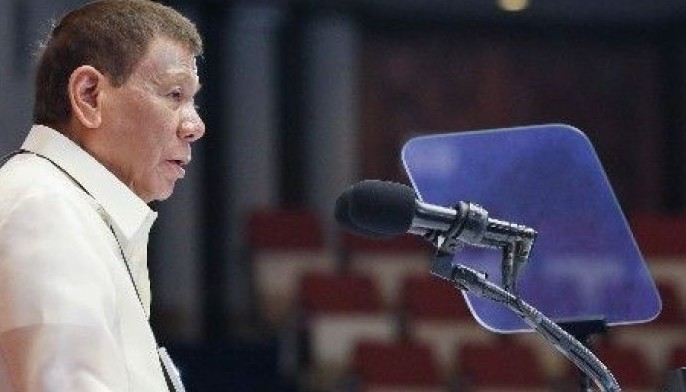MANILA, Philippines (Updated 7:52 p.m.) — For what he said was his “longest” State of the Nation Address (SONA), if not trimmed, President Rodrigo Duterte’s penultimate report to the nation was lacking on comprehensive details of a much-awaited pandemic recovery program.
In a SONA that lasted for about an hour and a half, Duterte attacked Senator Franklin Drilon, chastised the “oligarchs” and threatened telco companies over their allegedly lousy service, but failed to detail what presidential spokesperson Harry Roque said was a “roadmap” to recovery from the coronavirus disease-2019 (COVID-19).
Related Stories
Businesses were looking at Duterte’s SONA for guidance on what the government intends to do to ensure that the economy recovers from the damage of COVID-19-induced lockdowns. Instead, what they got was a call for Congress to pass a wish-list repeatedly asked for by economic managers over the past months: the Bayanihan to Recover As One and the Corporate Recovery and Tax Incentives for Enterprises (CREATE) bills.
“I hope that we can get some or the same treatment of clarity, purpose and the fastness to support the passage of the Bayanihan [to Recover as One Act], which will supplement funds for recovery and response against the impact of the COVID-19 pandemic,” Duterte said.
“We must facilitate the country’s economic recovery. I call on Congress to fast-track the passage of proposed measures such as the Corporate Recovery and Tax Incentives for Enterprises or CREATE Act,” he added.
Sought for comment, John Forbes, senior adviser at American Chamber of Commerce and Industry, an industry group, said while indeed Duterte “did not focus much on the pandemic and economic recovery,” the group welcomes proposals to help small firms battered by the pandemic to survive.
Not enough
As it is, Bayanihan II and CREATE bills are supported by businesses. But various observers said the two government-preferred modes of stimulus, which add a tiny P140 billion direct allocation to existing budgets, hardly meet the need of a weakening economy and a struggling job market to bounce back from the current health crisis.
For one, Bayanihan II merely extends the power of the president to move around funds within the existing P4.1-trillion outlay to finance COVID-19 programs. However, questions remain as to how much funds can still be reallocated given that from March to June, around P354 billion was already repurposed, and the budget department said other funds may no longer be touched.
Bayanihan II does add a fresh budget of P140 billion which the government can spend on top of the outlay. But most funds will go as fresh capital to banks, which government hopes would lend out credit to businesses in dire need of liquidity. A central bank survey released Monday showed lenders have tightened credit standards for borrowers, making it more difficult— and tedious— to borrow.
Another solution is the CREATE bill, which automatically reduces the corporate income tax rate to 25% from 30%, while lengthening the period at which tax perks may be availed. Many say an indirect support from CREATE would hardly make a difference for companies looking for cash to operate.
ARISE and other matters
What many were awaiting for in the SONA, which Duterte did not mention, was for the president to endorse the passage of House Bill 6815 or the P1.3-trillion Accelerated Recovery and Investments Stimulus for the Economy (ARISE) bill. Economic officials oppose ARISE over its hefty price tag, a position that has put them at loggerheads with the bill's congressional proponents.
Marikina Rep. Stella Luz Quimbo, ARISE’s bill co- author, said she is amenable to incorporate ARISE’s provisions in either Bayanihan II or the 2021 budget, but expressed some concerns on doing so.
“If these interventions will be pursued as separate programs, as embedded in the 2021 budget and not bundled as a single stimulus package, we lose the opportunity to do a proper monitoring of these interventions, through congressional oversight,” Quimbo said in a text message.
Albay Rep. Joey Salceda, also a co-author, said Duterte's SONA only “means he supports the DOF (Department of Finance) on the passage of Bayanihan (II).”
But Salceda added while ARISE was excluded from the SONA, the nitty-gritty of the bill was essentially mentioned and supported by Duterte, foremost of which was support micro-, small- and medium enterprises (MSMEs).
Duterte did highlight the importance of MSMEs to the economy, and asked leasers to give leeway to their renters when paying rents. He also called on the central bank and lenders to extend “regulatory relief” to these firms, which includes loan extension payments. However, most of these interventions had and are already being enforced.


